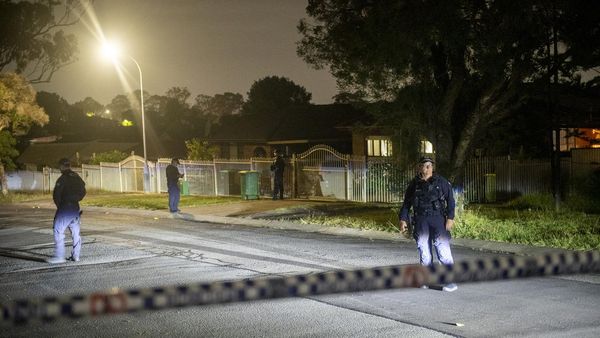
Contemplating the notion of crossing the line, Russell Brand once remarked: “As I always say, there is no line. People draw that line in afterwards to fuck you up.” Anyway: here we all are in the afterwards.
Back in the day, though, a lot of people were thrilled to be on what they thought was Russell’s side of the line. For a certain type of mournfully uncool man on the left, Russell Brand was quite the excitement. You only had to watch their little faces in his presence – lit up at being fleetingly indulged by the kind of guy who would probably have bullied them at school. He was a sports columnist at the Guardian (often also writing opinion columns), he guest-edited the New Statesman, while the apogee of this particular stage of Brand’s inevitable journey toward alt-right-frotting wingnut was surely the ludicrously feverish speculation over whether he’d endorse Labour in the 2015 general election. Keen to be awarded his royal warrant, the then Labour leader, Ed Miliband, traipsed to Brand’s London flat during the final stages of the campaign, for a filmed interview where committed non-voter Russell inquired rhetorically: “Since suffrage, since the right to vote, what has meaningfully occurred?” Nothing much, he reckoned. Somehow, this disqualifyingly moronic assumption did not deter his political acolytes.
I had no truck with any of this bollocks – but I don’t think it will quite do for me to spend even a nanosecond on self-congratulation, because I got other things wrong. Today I want to talk about something that at the time was called Sachsgate, because it seems quite a useful way round the current insider debates on “who knew what when” as far as Brand was concerned. This is because Sachsgate wasn’t comedy circuit rumour, or backstage telly whispers, or anything else that you or I never heard of, being out of those loops. It happened on air, then played out in the full glare of the media spotlight. So total was this story’s Fleet Street dominance for weeks that it knocked a certain other little story – the 2008 financial crisis – off the front pages day after day.
Somewhat like the out-of-control bankers, Brand was a master of his universe, and one October evening found him prerecording his Radio 2 show with guest co-host Jonathan Ross. Andrew Sachs – Manuel from Fawlty Towers – had been due to be a phone guest. Brand had had a fling with his granddaughter, who was called Georgina Baillie, and when the then 78-year-old Sachs didn’t pick up, the pair began leaving messages on his voicemail. In the first one, Ross shouted “he fucked your granddaughter” – and three more messages to Sachs later, the pair had added grimness to horror, including singing songs. “It was consensual and she wasn’t menstrual,” warbles Brand at one point. Brand subsequently revealed Ross had tried to make him cut the calls from the broadcast, but he refused. The BBC aired it. From here, I’ll assume you have access to Wikipedia.

As for the wider backdrop, explaining “the culture” for women during the 2000s is quite hard if you weren’t there. (I am very much looking forward to Toxic, a forthcoming book by the writer Sarah Ditum, which promises to enlighten those who swerved the decade and bring back shudder-inducing memories for those who didn’t.) When it wasn’t unremittingly vicious (Britney), it was weird and gross, top to bottom. And 2008 was also the year in which even the then Lib-Dem leader, Nick Clegg, felt moved to tell GQ he had slept with up to 30 women.
What is completely bizarre, with the benefit of 2023 hindsight, is how the Sachsgate story was framed, both by those who were reflexive defenders of the BBC and “comedy” and free speech (then a somewhat lefty preoccupation, funnily enough), AND by those who wished their destruction. Fleet Street quickly settled into tribes and covered it as a story where each assumed the other was acting out of vested interests. This was back when our only culture wars were about things that happened on the BBC. (My how we’ve grown.) Mail vox pops were incandescent; some Guardian ones found it an “overreaction”.
When the Brand expose broke last weekend, I found myself transported back to that time. And with my 2023 head on, rather sickening alarm bells began to ring, because I knew – I knew – that I wouldn’t have centred anything I wrote about it on Georgina Baillie. I had this shaming suspicion I had treated it as a sort of media story – and so it proved. My mentions of it say Ross and Brand were total scumbags, but they chiefly ridicule the fact that people complained to Ofcom because of the Mail titles’ coverage, despite never having heard the original broadcast. I mean … so what? Speaking of moronic points: LOOK NO FURTHER. Dear 2008 Marina: you think you’re being clever but you’re being horribly obtuse. Get your head out of your arse. It doesn’t matter whether or not they heard it, it’s still hideous and they have every right to think it’s absolutely unacceptable for the BBC to have aired it.
Yet despite getting it right on the vileness of the broadcast, the tabloids pursuing the BBC got it wrong by endlessly and ferociously slut-shaming Georgina Baillie (even though slut-shaming wasn’t a term people used at the time). They cast the entire affair as an insult to Andrew Sachs, instead of to Baillie as well. She was roundly blamed. I’m sorry if the Guardian’s cuttings archive is incomplete and I’ve missed something, but I couldn’t find a single column centred on defending Baillie in any contemporaneous newspaper. A year later, Baillie sold an interview and underwear photoshoot to the Sun in which she said the media maelstrom had sent her “insane”, subsequently telling the Guardian she was “a tart with a heart, a nice girl”. I am mortified to see I reacted to this by saying she should stop banging on about the whole thing.
In fact, Baillie sank into addiction and out of the public eye (barring the fact that the Brand story will probably be all anyone sees when they Google her for the rest of her life). But last weekend, she gave an interview to the Mirror in which she reiterated that her relationship with Brand had been consensual, though the radio prank and its nuclear fallout had obviously been anything but. Brand made millions with a standup tour in which he mined the incident and further humiliated her, while – among other desolations – her grandfather didn’t speak to her for eight years. She revealed that Brand had got in touch apologetically a few years ago, and paid for her stint in rehab. Georgina’s reflections were so without fury and blame as to be utterly heartbreaking. “For about 10 years after Sachsgate it was very hard,” she said, “because I didn’t know whether I was in the wrong, so when he apologised it was a huge weight lifted off me.” That quote floored me. She spent a decade thinking it was all her fault. That’s “the culture” right there.
I’m just one of the many people who got many different things wrong about how that story should have been covered and framed. If we have learned anything – and I’m not entirely convinced we’ve learned nearly as much as we think we have – then it is vital we all treat these newly uncovered stories better, as the Sunday Times, the Times and Dispatches most certainly have with their painstaking investigation. And as I hope I have done with other stories, as I got older and a bit wiser. Tribalism is the enemy of truth and justice – even more now than then – and the victims must always be put at the heart of the stories which are, after all, theirs. However belatedly, that’s the right side of that line.
Marina Hyde is a Guardian columnist
What Just Happened?! by Marina Hyde (Guardian Faber Publishing, £9.99). To support The Guardian and Observer, order your copy at guardianbookshop.com. Delivery charges may apply.
Do you have an opinion on the issues raised in this article? If you would like to submit a response of up to 300 words by email to be considered for publication in our letters section, please click here.







